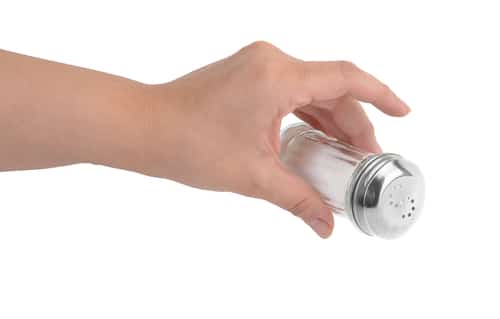
Some people mistakenly believe sodium is only harmful to people who have medical problems like high blood pressure, heart disease or kidney disease. Not so. Research shows a diet high in sodium damages the inner lining of blood vessels, increasing your risk for hypertension, stroke and heart disease.
You may not feel the effects, but when you eat a salty meal or a bag of salty French fries, your blood vessels experience a phenomenon called endothelial dysfunction. This means they don’t open up as wide as they should to let blood flow through. This happens within 30 minutes of eating something salty. Plus, some people are more sodium sensitive than others. Salt-sensitive people are more likely to experience blood pressure elevations when they eat a high-sodium diet.
Why Is It So Hard to Cut Back on Salt?
Most people have acquired a “taste” for salt. That’s because so many processed foods and foods they eat at restaurants are high in sodium. When you constantly expose your taste buds to high-sodium meals and snacks, low-sodium food begins to taste bland and flavorless. Your taste buds become desensitized to what unsalted food tastes like and you crave the salt shaker. There are even specific taste buds on your tongue that only recognize salt.
In one study, researchers found rats with higher levels of sodium in their blood displayed less anxious behavior and had less activity in stress centers in their brain. They also excreted more oxytocin, a hormone linked with socialization and feelings of love. Are we unconsciously using sodium-rich foods to ease stress? No one knows if this applies to humans.
There’s even evidence that salt is addictive. Research in mice shows that salt cravings activate genes linked with addiction to drugs like cocaine. One theory in the Medical Hypotheses Journal proposes that sodium addiction may be responsible for the rise in obesity. People are so addicted to sodium, they seek out salty fast food and processed foods to get their “fix” – and gain weight as a result. There’s certainly no proof of this, but there’s little doubt that people seek out foods high in salt.
Cutting Back on Salt: Breaking the Salt Habit
The best way to break the salt habit is to gradually cut back on salt, giving your taste buds a chance to regain their sensitivity. If you go “cold turkey,” food will taste too bland. There’s more to cutting back on sodium than holding the salt shaker. The biggest source of dietary sodium is processed food and food you get at restaurants. It’s a common misconception that fast food restaurants are the worst offenders. Sit-down restaurants are usually worse and higher-end ones are often the biggest culprits. That’s because chefs know that salt adds flavor to foods and they use it in abundance.
Cutting back and gradually eliminating processed foods and restaurant foods from your diet is the best way to train your taste buds to enjoy food again without too much sodium. Once you’ve weaned yourself from salt by gradually cutting back, you’ll again notice the flavor of foods minus the salt.
The good news? Low in salt doesn’t have to mean low on flavor. Herbs and spices add flavor to food and are an added source of antioxidants. If you can’t keep your hand off the salt shaker, fill it with a salt substitute or a light salt instead. Salt substitutes are made of potassium salts, while light salts contain some sodium and some potassium. Sodium substitutes have a slightly bitter taste, while light salt has a better taste because it contains sodium. They’re both a better option than table salt unless you have kidney disease or other medical problem that limits the amount of potassium you can take in.
The Bottom Line?
Reducing dietary salt is challenging in a world where it’s in all the processed and packaged foods you buy at the supermarket. Once you cut back or eliminate these, you’ll be getting far less sodium. Is it worth it? If you’re concerned about the health of your blood vessels it is.
References:
He FJ, MacGregor GA. Effect of longer-term modest salt reduction on blood pressure. Cochrane Database Syst Rev. 2004: CD004937.
Circulation. 2012;125:3108-16. Epub 2012 Jun 18.
PNAS 2011 108 (30) 12509-12514.
Medical Hypotheses Journal 2009;73: 892-899.
Related Articles By Cathe:
How Does Sea Salt Differ from Table Salt?

